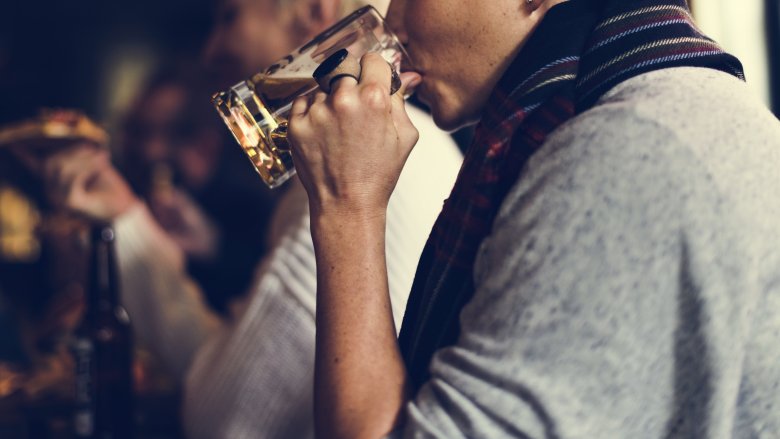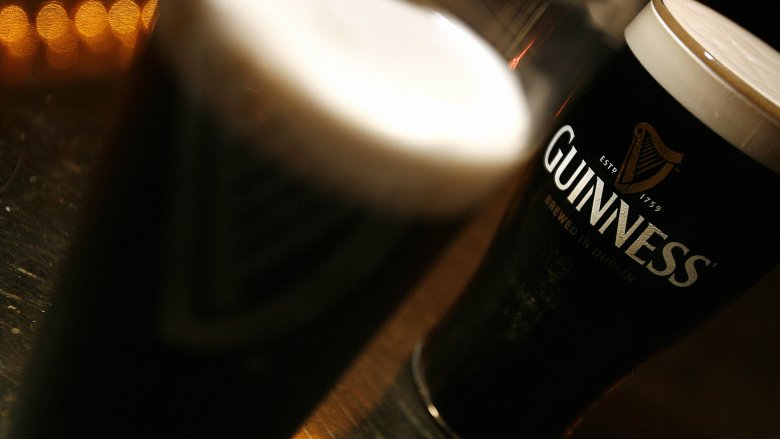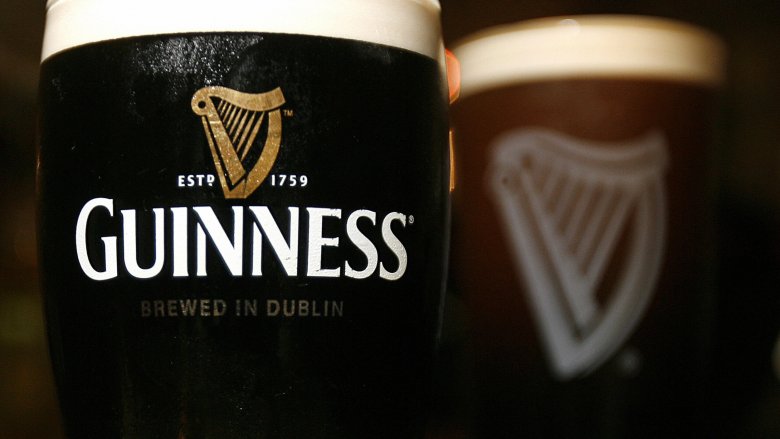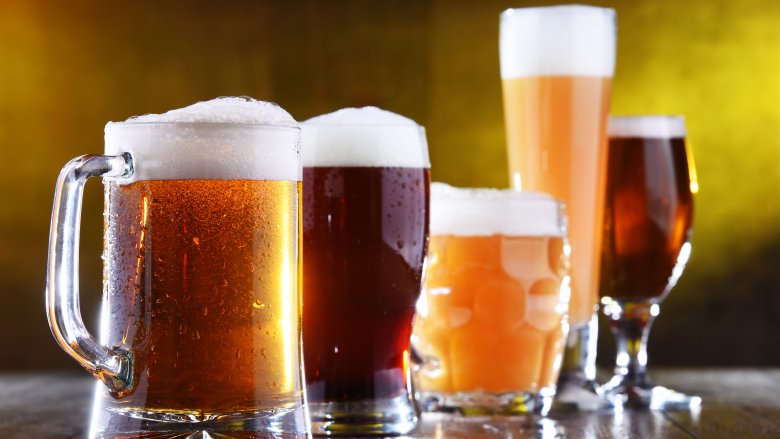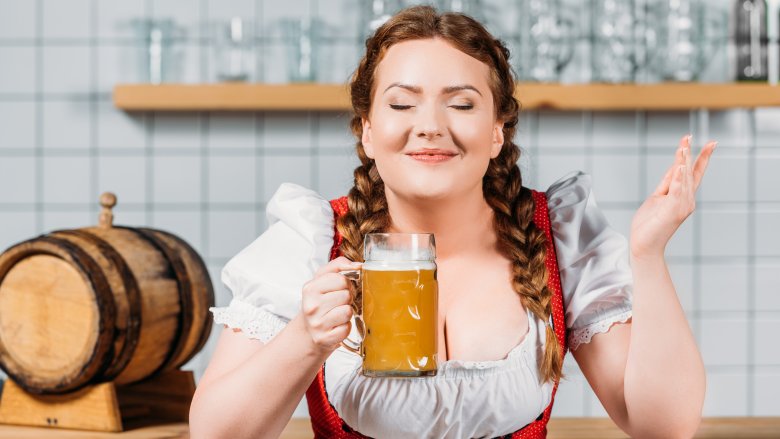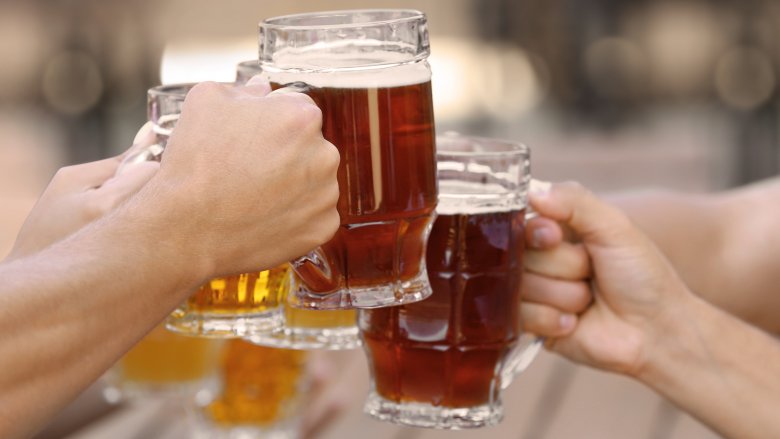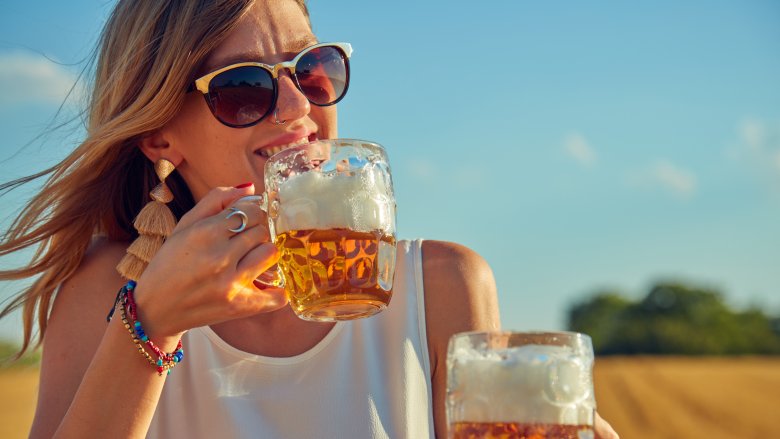Reasons Why Beer Is Actually Good For You
Coffee might be the elixir of life (and morning functionality) and a late-night cocktail might be just what you need after a long day, but beer? Beer is something else entirely, and there are some moments that just call for kicking back with a cold one. Lager or stout, red ale or IPA, it doesn't matter what your drink of choice is, there's no denying that some of the best moments in life are sitting in the yard with a best friend, relaxing, and sharing a few beers.
But with that comes a certain amount of concern. There's always the chance of over-indulging, and when it comes to alcohol, beer has the reputation of being the one that's going to put a few inches on your waistline. (And that's not even getting into all the other bad stuff that goes along with heavy and binge drinking; that's an entirely different topic.) As far as benefits, it's red wine that's good for you, you've probably heard, and beer... not so much.
Fortunately, science can be kind of awesome, and there's been some fascinating studies on why beer — in moderation — can actually be good for you. Really! Honestly! So, let's talk about the reasons why you should be drinking the occasional beer.
Beer will help keep your bones strong
Many of us grew up hearing how milk is one of the best things you can drink for strong bones, but here's some exciting news for grown-ups: it turns out that science says beer is pretty great, too.
But surprisingly, it's not because of calcium.
According to research done by the University of California, Davis (via Science Direct), beer contains high amounts of dietary silicon, which has been found to be a key ingredient in the body's ability to maintain healthy connective tissue and bones. Furthermore, the type of silicon in beer is one that has about a 50 percent bioavailability, and that means it's in a form your body can process. (LiveScience says you can compare that to a banana, which also comes with silicon, but in a form that's only 5 percent bioavailable.) From those findings, they suggested that beer consumption — in moderation — might help fight osteoporosis.
Not all beer is created equal, though. The silicon content comes from hops and malted barley, so beers with high levels of both contain more silicon. In other words, you'll want to pick up particular beers if you're looking to get a boost in dietary silicon, and those are varieties lighter in color, like IPAs, ales, and pale ales.
Beer can keep you smiling pretty
A beer a day can keep the dentist away? Maybe! And anything that can keep the dentist far, far away is good by most of us.
According to Healthline, there have been some — but not many — studies done on the impact beer (and particularly, hops) has on your teeth. And it's good news, so far, with research suggesting it might very well help you fight cavities.
Take the results of a joint study published in the Journal of Biomedicine and Biotechnology (via NCBI). They looked at a selection of drinks — including Guinness, black and green tea, and cranberry juice — then looked at how effective they were in destroying the bacteria that causes things like gingivitis and cavities. Guinness had some serious antibacterial and antimicrobial properties, and it was also found to help keep all those little nasties that did survive from adhering to your teeth and setting up a permanent home there. It might not replace your toothbrush, but it looks like it can't hurt, either!
Yes, beer makes you more creative
It's well known that a lot of great writers tapped into their genius by having a tipple or two before picking up the pen, but does alcohol really make you more creative? Science actually says that yes, it does.
The University of Illinois-Chicago (via Fast Company) conducted a fun study where they found out just how creative beer could make a person. They divided subjects into two groups, and while one group drank nothing, the other group drank two pints of beer. Then, they were given three words (one example was "peach," "arm," and "tar") and asked what other word they had in common. (For that example, it was "pit.") The beer drinkers solved 40 percent more problems, and why it works is pretty fascinating.
Beer relaxes you, and when you're relaxed, the part of your brain that deals with intuition, association, and creativity is firing on all cylinders. When you're not taking yourself too seriously, you're better at making connections that a completely sober you might miss. You might be worse at dealing with problems that require logic and the ability to follow something through step-by-step, but sometimes, you just gotta fly by the seat of your pants — and beer helps.
Get your fiber through beer, with Guinness
Ah, the 1930s. It was a different time back then, and it was a time (along with the 1920s and 1940s) that Guinness was advertised as being good for you. It was practically a health drink, and it was even recommended for pregnant women and nursing mothers. (No, it's not anymore, let's say that right up front.)
But is there anything to the stories of Guinness being good for you? Researchers from the University of California, Davis wanted to find out (via CNN), and the answer is, "Sort of."
Guinness does contain high levels of folate, which is a B vitamin we all need. And good news, since there's a lot of unmalted barley that goes into Guinness, it's also got some of the highest fiber content of all the beers. And fiber, even though we can't digest it, is super important. It doesn't just help keep blood sugar and cholesterol in check, it also helps keep us feeling full, says the Harvard School of Public Health.
That fiber — coupled with Guinness's trademark foamy head — is why this stout feels so heavy when you drink it. But in reality, it has less calories than Sam Adams, Budweiser, or Heineken, and it's got a lower alcohol content. So, next time you reach for a light beer, reach for Guinness — you'll get some health benefits and less calories.
Beer might help lower your risk of diabetes
Good news, guys — that beer might help you lower your risk of developing diabetes.
That's according to Healthline, and a study published in the journal of the European Association for the Study of Diabetes. Researchers looked at 70,000 adults and found that when compared to those who didn't drink at all, those who were classified as moderate drinkers had fewer cases of diabetes.
There's more to it, too. They looked at what people were drinking, and found that men and women who drank red wine had as much as a 30 percent lower change of developing diabetes than their abstaining peers. That's in line with the findings of more than a dozen other studies, but we're not talking about wine, we're talking about beer.
For men, they found that drinking between one and six beers a week was just the right amount to lower the risk of diabetes by 21 percent. There was no such correlation for women, although a study in Spain (via Diabetes UK) looked at 1,249 men and women and found that a pint of day did reduce the risk for both men and women.
But, there's a catch. That first study found that women who drank more than seven drinks a week increased their chances by a whopping 83 percent. And that just goes to show how important moderation is: too much of a good thing can turn into a very, very bad thing indeed.
Beer might help keep your heart healthy
Here's where we need to talk about something important: moderation. According to the Harvard Medical School, beer can have a positive impact on your heart health, but they're talking about around one drink a day. Any more than that, and you can start doing more harm than good.
So, what's going on here? According to a study published in the European Journal of Epidemiology (via LiveScience), data from 200,000 people suggested that drinking one pint of beer a day lowered the risk of heart disease by an average of 31 percent.
Why? It's all about the alcohol, which has been linked to helping raise good cholesterol. We hear a lot about cholesterol and why it's bad, but this is the good stuff that actually helps protect your body against heart disease. Wine does the same thing, but here's the catch — beer fills you up faster than the equivalent amount of wine, and that means it's easier — and more fulfilling — to limit yourself to just one.
And those findings were supported by a study published in the journal Nutrients in 2018. They specifically looked at the effects of light to moderate drinking in individuals that were overweight or obese, and came to the conclusion that not only were there no negative effects, but that beer-a-day routine helped prevent fatty build-ups from forming in the cardiovascular system.
Beer might be good for your eyes
According to the National Eye Institute, cataracts are extremely common and they're usually just one more annoying side effect of the aging process. Cataract surgery is one of the most common surgeries in the U.S., but any time you can avoid surgery is a good thing, right? And the science is still out on this one, but beer — in moderation — might just help you dodge this unpleasant process.
According to research presented to the International Chemical Conference of Pacific Basin Societies (via the BBC), studies have shown that the antioxidants in beer — especially the ones found in stout and ale — are particularly good at protecting the eyes against damage that leads to cataracts. And they suggest you don't need to drink much to get the full benefits, just one beer a day.
Later work done by Sun Yat-Sen University (via the National Library of Medicine) found there was a definite lack of thorough studies done in the area of examining the relationship between alcohol and cataracts, but did note that when they compiled the findings of the studies that had been done, they confirmed that there seemed to be no added risk for even moderate to heavy drinkers. That one beer a day isn't going to hurt your eyes, and it just might help you see clearer in the long run.
Beer could help your immune system function better
If you feel a cold coming on, you might reach for the orange juice and a boost of vitamin C. According to research from the University of California, Riverside (via Medical News Today), an alcoholic drink just might have more of a positive impact on your immune system than all that OJ.
Essentially, the research had to do with a study where rhesus monkeys were vaccinated against smallpox, then monitored to see how well their immune systems reacted to the vaccine. During the experiment, the monkeys were divided into three groups: one had access to sugar water, and two others had access to alcohol. Some became heavy drinkers and some became moderate drinkers, and when the monkeys were re-vaccinated and examined again, it was found that they no longer all had the same immune response. Using the monkeys that drank the sugar water as a sort of control group, they found the heavy drinkers had less of a response to the vaccine, while the moderate drinkers had a boosted immune system and were more responsive to the treatment.
Findings from the Consejo Superior de Investigactiones Cientificas (via Pub Med) supports the idea that while extreme beer and wine consumption will suppress immune system function, moderate consumption does, in fact, seem to have a positive effect on our immune systems and our ability to fight off disease.
Beer is an anti-inflammatory and could help stop arthritis
In 2018, the Warsaw University of Life Sciences (via The Independent) released the results of a 16-year study that included 70,000 men and women. Those who ate an anti-inflammatory diet — one including moderate amounts of beer and wine — had an 18 percent lower risk of death, a 20 percent lower risk of heart disease, and a 13 percent lower risk of cancer.
What's going on here? Chronic inflammation is a root cause of a variety of illnesses, and sticking with a diet that lowers inflammation is nothing but good.
How much does beer contribute? During the 2011 Munich Marathon (via Men's Health), researchers recruited some runners to drink either alcoholic or non-alcoholic beer in the three weeks before and two weeks after the race, then measured instances of respiratory illness and muscle inflammation. Those that had the real beer were three times less likely to develop a respiratory condition, and suffered 20 and 32 percent less inflammation. Why? Because of beer's polyphenols, which are such a powerful antioxidant there's a growing body of research that's looking at the possibility of using them to replace NSAIDs like ibuprofen.
What about arthritis? According to the Arthritis Foundation, there is research that shows a regular pint can help reduce the inflammation that causes the worst of your symptoms, but given that it also could interfere with other medications, they do recommend checking in with a doctor before pulling your pint.
There's a gut-friendly beer in the future
We've all heard of how important gut health is, and when we think of foods that can help us maintain a happy gut, it's usually yogurt that comes to mind. But fermented foods come to mind, too... so what about beer? It turns out that if science has anything to do with it, there might just be a whole line of probiotic beers in the future.
According to Science Daily, the National University of Singapore has been developing a strain of probiotics and a brewing recipe that's resulted in a tart-tasting beer that's about 3.5 percent alcohol and full of all kinds of live, good-for-your-gut bacteria. When is the last time you were this excited about probiotics? Never, right?
Researchers filed for a patent in 2017, and they also say that this isn't just some neat laboratory work. They're hoping to find a partnership that will let them mass produce the beer and bring it to consumers. There's no telling when that's going to happen, but we can look forward to it!
In the meantime, you might want to just reach for one of those delicious Belgian beers, instead. According to a presentation given at the University of Amsterdam in late 2019 (via Independent), the double fermentation process most strong Belgian beers go through yields not just a higher alcohol content, but acids that kill harmful gut bacteria. Again, moderation is key: drink too much and you'll imbalance your gut in a bad way, but one a day seems to keep everything working the way it should.
Why didn't you know beer was healthy?
If beer is so good for you and comes with all these benefits, why don't we hear more about it? It's complicated.
CNBC points out that most of the studies that discovered the benefits of beer come with a footnote, and it's of the cautionary variety. It's easy to see all these benefits as being reasons to drink too much, and no medical professional wants to recommend that. There's also the fact that nothing acts on the body alone, and along with even moderate beer consumption comes other things to consider, like other medical conditions, medications, and family history.
And then there's the fact that research on the effects of alcohol is tough. When researchers discovered the link between a lower risk of heart disease and moderate drinking, they also said that further testing would be difficult, even calling most extensive studies "ethically questionable" (via LiveScience).
And then, there's the warning from the Arthritis Foundation. While beer has been shown to reduce inflammation and might help relieve the symptoms of arthritis, there are cases where drinking can do more harm than good. There are also other medicines that can be prescribed to have the same effects — often without the same risks — and drinking too much can definitely make the bad consequences outweigh the benefits. Bottom line? Moderation is key, the benefits are there, but when in doubt, check with a qualified medical professional.

